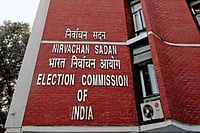The Supreme Court has directed the Indian Air Force (IAF) to pay around Rs 1.5 crore as compensation to a veteran who contracted HIV due to transfusion of infected blood at a military hospital in Jammu and Kashmir's Samba in 2002.
The veteran, who held a combatant rank had taken ill during "Operation Parakram", launched in the aftermath of the terrorist attack on Indian Parliament on December 13, 2001, and was admitted to the hospital where he had to be administered one unit of blood.
A bench of Justices S Ravindra Bhat and Dipankar Datta said, "It is held that the appellant is entitled to compensation, calculated at Rs. 1,54,73,000 towards compensation on account of medical negligence of the respondents, who are held liable for the injury suffered by the appellant."
It said since individual liability cannot be assigned, the respondent organisations (IAF and Indian Army) are held vicariously liable, jointly and severally.
"The amount shall be paid to the appellant within six weeks by the IAF, his employer; it is open to the IAF to seek reimbursement, to the extent of half the sum, from the Indian Army. All arrears related to disability pension too shall be disbursed to the appellant within the said six weeks period," the apex court said in its verdict pronounced on Tuesday.
The bench said people sign up to join the armed forces with considerable enthusiasm and a sense of patriotic duty, and this entails a conscious decision to put their lives on the line and be prepared for the ultimate sacrifice of their lives.
"A corresponding duty is cast upon all state functionaries, including echelons of power within the armed forces to ensure that the highest standards of safety (physical/mental wellbeing, medical fitness as well as wellness) are maintained.
"This is absolutely the minimum required of the military/air force employer for not only assuring the morale of the forces but also showing the sense of how such personnel matter and their lives count, which reinforces their commitment and confidence," it said in its 60-page verdict.
The top court said any flagging from these standards, as the multiple instances in the present case have established, only entails a loss of confidence in the personnel, undermines their morale and injects a "sense of bitterness and despair" not only to the individual concerned but to the entire force, leaving a sense of injustice.
"When a young person, from either sex (as is nowadays the case) enrols or joins any armed forces, at all times, their expectation is to be treated with dignity and honour," it said, adding the present case has demonstrated again and again how dignity, honour and compassion towards the appellant were completely lacking in behaviour by the respondent employer.
It said, repeatedly, the record displays a "sense of disdain", and "discrimination", even a hint of stigma attached to the appellant, in the attitude of the respondent employer.
"Although this court has attempted to give tangible relief, at the end of the day it realises that no amount of compensation in monetary terms can undo the harm caused by such behaviour which has shaken the foundation of the appellant's dignity, robbed him of honour and rendered him not only desperate, even cynical," Justice Bhat, who penned down the judgement said.
The top court passed the verdict on an appeal by the IAF veteran who challenged an order of the National Consumer Disputes Redressal Commission (NCDRC) rejecting his claim for compensation.
-With PTI Input


























